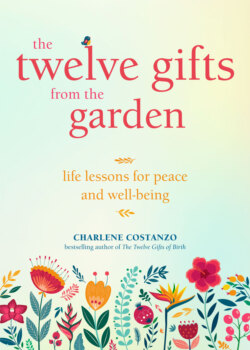Читать книгу The Twelve Gifts from the Garden - Charlene Costanzo - Страница 16
На сайте Литреса книга снята с продажи.
ОглавлениеThe Beach Garden
The human soul is hungry for beauty;
we seek it everywhere… When we experience the Beautiful, there is a sense of homecoming.
—John O’Donohue
It’s early in the morning and I’m setting out for a beach walk to the Sanibel Lighthouse. A portable cassette player hangs from the belt on my shorts. After trudging through soft dunes, when I reach the hard-packed sand near the low-tide line, I turn left, toward the rising sun, and stretch. I set off. Keeping pace with the dance music playing, I step carefully around sandcastles and people bent at the waist, searching for shells in the classic “Sanibel stoop” posture.
With a row of dolphins arching just beyond the breaking waves and hundreds of birds nibbling at the waterline, it is easy to appreciate nature’s beauty today.
About a half mile into my aerobic walk, I relax my pace to be in sync with the slower song playing.
I spot something above the high-tide line. Feeling drawn to it, I pull off my earphones and walk up from the water’s edge to get a closer look. It’s a simple, Zen-like garden made of leaves, twigs, and shells, some broken and some whole. In front of the garden, seaweed forms the word “Welcome.”
I wonder if the greeting is intended for beach walkers, for imaginary creatures, or for the waves that could eventually claim this creation. The garden is not nearly as impressive as the sandcastles I have passed; it exudes beauty nonetheless. In fact, I like it so much that I decide to take a picture of it. That will have to wait until later though, because I am without my camera now. I replace my earphones and continue on my walk.
Later I return to the beach-debris garden with my camera and see a family of four setting up blankets quite near it. I introduce myself, learn that they are indeed the creators of the beach garden, and complement their creativity, especially their use of natural beach debris. The children thank me and tell me it was fun.
Their mother, stepping away from the rest of the family, gestures for me to follow. She says that she’d like to tell me the story of what happened.
She explains that she, her husband, and their two preteens had made a similar beach-art creation two days before. They’d had fun playing together, she said. When they stepped back and saw the result, they were pleased and hoped that beach walkers would enjoy it.
When they came out to the beach early the next morning, however, they discovered that it had been destroyed. Footprint evidence suggested that someone had stomped through their little creation, deliberately swishing and smashing his large feet around in it.
“When I saw the hurt on my children’s faces, intense anger rose in me,” says the mother. “Who would do such a thing? Why? I wanted to crush whoever did it. Fueled by fury, I marched down the beach, cursing the young man who I imagined did it, and, I have to admit, wishing him all sorts of harm.” With a chuckle and a smile, she says, “I’m guessing that to passersby I looked quite fierce.” She says that she had walked until her anger was spent, which brought her to the lighthouse at the end of the island. There she sat and thought, “What are my children learning from this? That some people are senselessly mean? To mistrust? To hate?”
“When I released the last of my anger, I felt something open,” she says, “and the Dalai Lama came to mind. A sixth of the Tibetan population was killed in the 1950s. When he is asked about that holocaust, he responds with compassion for the people who did it. I then saw other possible lessons my children could learn from this experience.”
She explains that when she had arrived back at the site, she had asked her family to forgive the perpetrator and to help her repair the garden. At first they resisted. So, she started to rebuild it herself. Soon, her husband joined her. Then, the daughter. Finally, the son. After a short time, they worked again in a playful way with ease and trust. They enjoyed another morning in the sunshine, arranging flotsam and jetsam in attractive patterns. They forgave the debris-garden vandal, wished him well, and agreed that what emerged this second time around was actually far prettier than what they had made the day before. She says, “When we finished, my son suggested adding the word ‘Welcome’ as a greeting and an acceptance of whatever would become of it.”
For a moment I’m speechless, in awe of the mother’s wisdom and compassion, and the son’s maturity and understanding.
“Thank you,” I manage to say. “Thank you for telling me your story. I admire you. What an example for your children. Not only to forgive him, but to wish him well. And for your son to suggest adding ‘Welcome!’ I’m so impressed. I will remember you.”
I take several photos of the beach-debris garden before leaving the family alone to enjoy the rest of their day.
